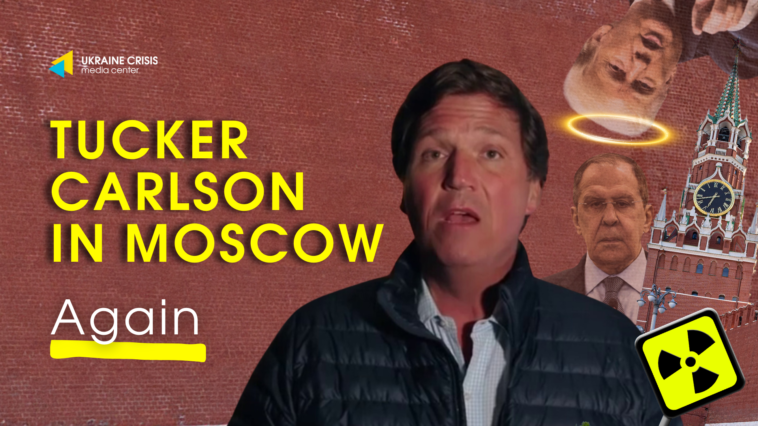Written by Matt Wickham
Tucker Carlson in his teaser trailer, released on December 3, reveals that he is back in Moscow, cosying up, once again, to top Kremlin officials to interview Sergey Lavrov, Russia’s foreign minister since 2004, a staple of Kremlin propaganda. His goal? Much the same as the previous try, to deliver Kremlin narratives directly to his Kremlin-appeasing audience—Trump supporters who are eager to believe that a Trump presidency will de-escalate the current war and stabilise relations with the US’s historic number one enemy by giving the Kremlin everything it wants.
Carlson’s previous Moscow visit provided Putin with a two-hour platform to rewrite history—uninterrupted and unchallenged. Putin’s narrative was presented by Carlson as indisputable truth, with a clear message: Ukrainian officials, the current U.S. administration, Intelligence agencies, and historians—have got it all are wrong, Russia is the victim.
Now, 10 months after his first trip to the Kremlin, Carlson is back for round two, ready to amplify more distortions and feed them to an audience eager to “eat them up”. But in truth, instead of holding the Kremlin accountable, he is only assisting a regime hellbent on destroying the current world order and status quo that Americans say they long to maintain. Just as Walter Duranty did for the Soviet regime back in the 1930s.
Propaganda: The Biden administration has pushed the United States and Russia to the brink of nuclear conflict, with no diplomatic channels remaining between the two nations – “Blinken cut off all contact with Russia and the US government. There is no back channel”
Counter: Carlson’s claim that there are no diplomatic or “back channels” between the U.S. and Russia is clear cherry-picking manipulation. While relations are undeniably strained, they are far from nonexistent. Both countries maintain fully operational embassies, and even though Secretary of State Blinken has not engaged directly with Lavrov, other key communication lines remain intact. U.S. Secretary of Defense Lloyd J. Austin III spoke with Russian Defense Minister Andrey Belousov in July 2024, and spy chiefs CIA Director Bill Burns and SVR Chief Sergei Naryshkin have held multiple official conversations throughout the war.
Moreover, despite Kremlin manipulation, nuclear deconfliction lines—or “hotlines”—appear to remain active (as they have been reported to be at times throughout the war). However, in a recent interview, Kremlin Press Secretary Peskov denied their use. Peskov’s comments leave room for interpretation and manipulation, a Kremlin favourite in terms of informational ambiguity.
Even so, Russian Foreign Minister Sergey Lavrov confirmed in this very interview the existence of a communication “channel” that was recently used before the ballistic missile launch of the “Oreshnik.” Russia informed the U.S. 30 minutes in advance of the launch to ensure the US didn’t interpretation the “test” as something more sinister. Therefore demonstrating that some form of operational communication remains in place—contradicting Carlson’s manipulation.
Propaganda: Carlson claimed he’s been trying to interview Zelensky but that the Ukrainian president is “banned” by the US from speaking with him
Counter: Carlson’s claim that Zelensky is “banned” by the U.S. embassy in Kyiv from giving him an interview echoes the tired Russian narrative that Ukraine is merely a U.S. puppet, lacking agency or independence. This line fits neatly into the Kremlin’s broader effort to portray Ukraine as a threat to Russia’s security—one that supposedly exists because the U.S. is “right on Russia’s doorstep.”
In reality, Zelensky has shown a willingness to engage with almost any Western media outlet. In fact, a willingness to speak to the West far more than the Ukrainian people has actually caused significant annoyance among Ukrainians. And that willingness shown by Zelensky is open to even those with pro-Kremlin leanings, to set the record straight.
Carlson, however, has shown no genuine interest in engaging with the Ukrainian president with the same openness and depth as he has with the Kremlin’s leadership. If Carlson truly cared about Ukraine’s perspective, he could have arranged an interview with Zelensky or another pro-Ukrainian figure long ago. The full-scale war has been raging for nearly three years—why, all of a sudden, does Carlson show interest in speaking with Ukrainian officials now? Or what about in the past decade since Russia’s annexation of Ukrainian territories? Instead, he continues to parrot anti-Zelensky and anti-Ukraine rhetoric, which aligns with Moscow’s messaging that Ukraine is just a vassal state of U.S. foreign policy.
Meanwhile, recent reports show that Zelensky has agreed to an interview with Lex Fridman, a prominent U.S. podcast host whose audience includes both Republican-leaning and Kremlin-critical listeners—audiences much like Carlson’s. Zelensky has also expressed interest in speaking with Joe Rogan, although Rogan has, thus far, refused to extend an invitation.
Carlson, who many suspect might be in line for some hefty Kremlin payouts—after all, what other American journalist has enjoyed such unlimited access to the Kremlin’s upper echelons over the past three years?—remains tied to pro-Kremlin narratives, vilifying Zelensky while continuing to blame the West for the war that Putin started, continues, and will likely escalate further.
Propaganda: “Returning Russia to the West” and if Trump’s presidency could end the war
Counter: The prospect of “returning Russia to the West” as discussed in the interview or Trump miraculously ending the war is pure fantasy—naive, strategically flawed, and morally untenable. Such questions, like this one posed to Lavrov, feed directly into Kremlin propaganda, implying that the West controls the path to peace while ignoring the harsh reality that only Putin can end this war. Putin has shown no interest in peace, and his recent actions indicate a willingness to escalate not negotiate.
The Kremlin’s imperialistic ambitions remain intact, regardless of how appealing potential concessions from a future Trump administration might seem. Trump’s vague promises to “end the war” rely on concessions that would strip Ukraine of its sovereignty—lifting sanctions, legitimising annexation of Ukrainian territory, giving Putin more than he probably thought possible. Framing the issue this way, as does Carlson, is a gift to the Kremlin, diverting blame from Russia’s aggression and placing it squarely on Western leaders.

